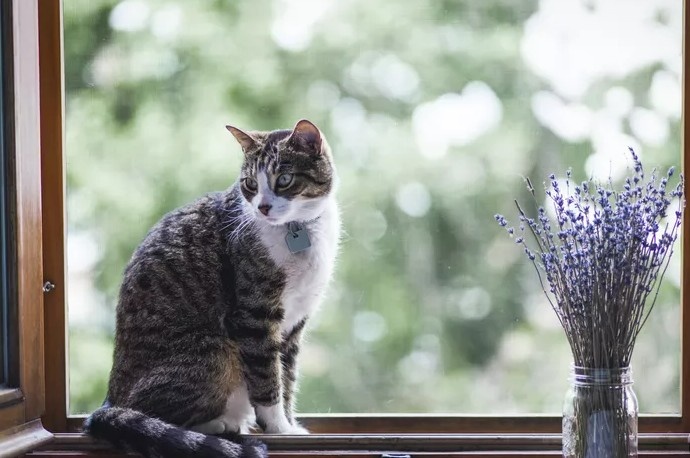🌸 Why Cat Owners Are Worried About Lavender
Lavender is everywhere — in your essential oils, candles, soaps, skincare, and even in your backyard garden. It smells amazing, helps with stress, and promotes relaxation for humans. But what about our feline friends?
If you’re a cat parent, you’ve likely asked: “Is lavender safe for cats?”
The truth is: Lavender isn’t entirely safe for cats. In fact, in some forms—like essential oils—it can be very harmful, even toxic.
Let’s explore how lavender affects cats, what symptoms to watch out for, and safe alternatives you can use at home.
🧪 Understanding Lavender and Its Risks for Cats
Lavender (Lavandula angustifolia) contains two main compounds: linalool and linalyl acetate. These are what give lavender its soothing scent—but they’re also what make it risky for cats.
Cats don’t have the necessary liver enzymes to break down these compounds, which makes lavender hard to metabolize and potentially toxic.
❌ Is Lavender Safe for Cats?
Let’s break this down by form:
1. Lavender Essential Oil – 🚫 Highly toxic
Lavender oil is extremely concentrated. Even a small amount—on your hands, in a diffuser, or on furniture—can be dangerous to cats if they inhale it, lick it, or rub against it.
2. Lavender Plant – ⚠️ Mildly toxic
While less dangerous than the oil, the actual lavender plant can still upset your cat’s stomach if they chew or eat it.
3. Lavender Scent (diffusers, candles, sprays) – ⚠️ Irritating
Strong lavender scents can irritate a cat’s lungs or cause sneezing, coughing, and even breathing trouble, especially in kittens or senior cats.
📊 Quick Keyword Summary (and What They Mean)
| Keyword Phrase | Is It Safe? | Notes |
|---|---|---|
| is lavender safe for cats | ❌ No | Especially risky in oil form |
| is lavender essential oil safe for cats | 🚫 No | Highly toxic |
| is lavender oil safe for cats | 🚫 No | Avoid completely |
| is lavender plant safe for cats | ⚠️ Not really | Can upset stomach |
| is lavender plant safe for dogs and cats | ⚠️ Caution | Dogs may also be sensitive |
| is lavender smell safe for cats | ⚠️ Risky | May cause respiratory issues |
| is lavender toxic to cats | ✅ Yes | Confirmed by ASPCA and vets |
| lavender oil cats | 🚫 Toxic | Avoid in any form |
😿 Signs of Lavender Poisoning in Cats
Cats are naturally curious. If they come into contact with lavender—by smelling it, walking through it, or licking it off their fur—they can show signs of toxicity or irritation.
🚨 Common Symptoms:
-
Vomiting or drooling
-
Lethargy or low energy
-
Difficulty breathing
-
Loss of coordination
-
Diarrhea
-
Muscle tremors
-
Pawing at their mouth or face
-
Sudden collapse (in severe cases)
If you notice any of these symptoms, call your vet immediately.
🐱 Real-Life Scenario:
Let’s say you just diffused lavender oil in your room. Your cat walks in, sniffs around, and rubs against the furniture. A few hours later, they’re suddenly very sleepy, drooling, and not eating.
💡 What to do? Turn off the diffuser, ventilate the room, wipe your cat’s fur with a damp cloth (don’t use soap!), and get in touch with your vet or a pet poison helpline.
🏥 What To Do If Your Cat Is Exposed to Lavender
-
Remove your cat from the room or area.
-
Stop using lavender products immediately.
-
Wipe off any oil from their skin or fur with a damp towel.
-
Ventilate the space to clear out lingering oils.
-
Call your veterinarian or a poison control center for animals.
-
Bring the product (oil, plant, or candle) with you for reference.
⚠️ Never induce vomiting at home unless told to by a vet.
🏡 Is the Lavender Plant Safe for Cats and Dogs?
The fresh lavender plant is mildly toxic to cats and dogs. While a small amount likely won’t be fatal, it can cause:
-
Vomiting
-
Diarrhea
-
General discomfort
-
Liver strain (in long-term exposure)
So, if your cat or dog loves nibbling on leaves, it’s best to keep the plant out of reach or avoid planting it in pet-friendly areas.
😾 Is Lavender Smell Safe for Cats?
Many cat owners wonder if it’s okay to light a lavender-scented candle or use lavender cleaning spray.
While it may seem harmless, the smell alone—especially from essential oils, diffusers, and aerosols—can irritate cats’ sensitive respiratory systems.
Better to avoid:
-
Plug-in diffusers with lavender
-
Essential oil sprays
-
Lavender-scented litter, shampoo, or cleaning agents
Even low exposure over time can affect your cat’s long-term health.
✅ Cat-Safe Alternatives to Lavender
Good news! You can still enjoy a clean and calm-smelling home without using lavender.
Try these pet-safe options instead:
| Alternative | Why It’s Better |
|---|---|
| Catnip | Safe, fun, and soothing for most cats |
| Chamomile (German only) | Calming and digestive support |
| Spider Plant | Safe, decorative, and air-purifying |
| Silvervine | Natural cat attractant and stress-reliever |
| Valerian Root | Helps with anxiety (use in moderation) |
| Pet-safe hydrosols | Water-based sprays with very low essential oil content |
Always research before bringing home any new plant or scent product.
👩⚕️ What Vets & Experts Say
According to veterinary toxicologists and organizations like the ASPCA Animal Poison Control, lavender is listed as toxic to cats due to compounds that their bodies cannot properly break down.
Essential oils, in general, are risky for cats. Their liver just isn’t equipped to handle strong, concentrated plant chemicals.
📌 Final Takeaway: Is Lavender Worth the Risk?
To sum it all up:
-
Lavender essential oil = 🚫 Dangerous
-
Lavender plant = ⚠️ Mildly toxic
-
Lavender smell = ⚠️ Risky for long exposure
-
Cat-safe options? ✅ Yes, you have many!
If you want your home to smell great and be peaceful, there are plenty of non-toxic options that won’t harm your pets.
Your cat’s health and comfort come first. Let’s keep their environment safe, simple, and scent-free (unless it’s catnip!).
🐾 Quick Recap for Busy Cat Parents
✅ Lavender oil = Toxic
✅ Lavender plant = Upset stomach risk
✅ Lavender candles/sprays = Can irritate lungs
✅ Better choices = Chamomile, Catnip, Spider Plant
✅ If exposed = Call the vet
🐾 Conclusion
So, is lavender safe for cats? Not really. While it may smell relaxing to us, it poses real risks to our feline companions—especially in the form of essential oils. Even the plant and scent can cause mild to serious health issues if your cat is exposed too often.
The good news? You don’t have to give up a calm, cozy home. There are plenty of cat-safe alternatives like catnip, chamomile, and spider plants that are just as soothing—and 100% pet-friendly.
👉 If you love your cat like family (and we know you do!), play it safe and keep lavender out of reach.
🛡️ Your cat’s health and safety come first—always.
FAQ’s
1. Is lavender safe for cats?
No, lavender is not considered safe for cats—especially in the form of essential oils. Cats can experience health problems if they inhale, ingest, or come into contact with lavender.
2. Is lavender essential oil safe for cats?
No, lavender essential oil is highly toxic to cats. Even small amounts can lead to symptoms like vomiting, drooling, and breathing difficulties. Avoid using it in diffusers or applying it near your cat.
3. Is lavender oil safe for cats?
Lavender oil—whether in a diffuser, spray, or skincare—is not safe for cats. Cats lack the liver enzymes to process essential oil compounds, which makes them highly vulnerable to lavender toxicity.
4. Is the lavender plant safe for cats?
The lavender plant is mildly toxic to cats. If your cat chews on the leaves or flowers, it may cause an upset stomach, vomiting, or lethargy. It’s best to keep the plant out of reach.
5. Is lavender plant safe for dogs and cats?
Lavender can affect both dogs and cats. While dogs may tolerate it better than cats, it’s still not considered fully safe. Both pets may show signs of discomfort if they eat or come in contact with lavender.
6. What happens if my cat inhales lavender smell?
Even the smell of lavender can cause irritation in cats—especially if it’s coming from a diffuser or spray. Cats may sneeze, wheeze, or become lethargic. If this happens, ventilate the area and remove the scent source immediately.
7. What are the symptoms of lavender poisoning in cats?
Look out for signs like:
-
Drooling or vomiting
-
Loss of appetite
-
Weakness or unsteady walking
-
Breathing issues
-
Pawing at the mouth
If you see these signs, contact your vet right away.
8. Are there safe alternatives to lavender for cats?
Yes! Try using catnip, silvervine, German chamomile, or spider plants. These are non-toxic and often enjoyable or calming for cats.

